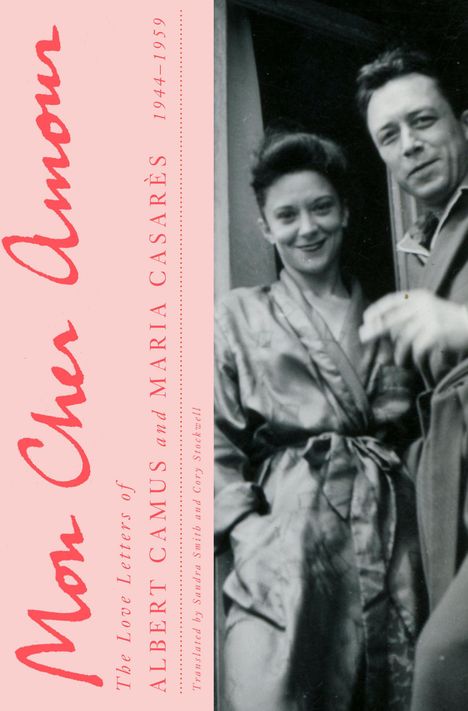Albert Camus: Mon Cher Amour, Gebunden
Mon Cher Amour
- The Love Letters of Albert Camus and Maria Casares, 1944-1959
Sie können den Titel schon jetzt bestellen. Versand an Sie erfolgt gleich nach Verfügbarkeit.
- Übersetzung:
- Sandra Smith, Cory Stockwell
- Verlag:
- Knopf Doubleday Publishing Group, 04/2026
- Einband:
- Gebunden
- Sprache:
- Englisch
- ISBN-13:
- 9780525656616
- Artikelnummer:
- 12381474
- Umfang:
- 1200 Seiten
- Gewicht:
- 567 g
- Maße:
- 235 x 156 mm
- Stärke:
- 48 mm
- Erscheinungstermin:
- 21.4.2026
- Hinweis
-
Achtung: Artikel ist nicht in deutscher Sprache!
Klappentext
The impassioned correspondence between the Nobel Prize--winning author and the renowned Spanish-born French actress who appeared in his plays, tracing the extreme highs and lows of their all-consuming love affair---a bestseller in France, translated for the first time into English
Albert. Albert chéri. Write me sweet, passionate things. Tell me you love me and how you love me. Tell me you'll take me to the sea one day---any sea at all---and that we'll spend time on the shore and in the water. Tell me you'll always be with me. Tell me about you, and especially today, talk to me about us. ---Maria Casarès to Albert Camus, February 1, 1950
It's said that the affair began on June 6, 1944, the day the Allied forces landed in Normandy. The twenty-one-year-old Casarès was starring in a production of the thirty-year-old Camus's play The Misunderstanding ---and one thing (an after-party hosted by Jean-Paul Sartre and Simone de Beauvoir) led to another.
Though their fling would be cut short by the end of the Occupation---and the return to Paris of Camus's wife, Francine---the two were destined to meet again: four years later, to the day, they crossed paths by chance on the Boulevard Saint-Germain.
Over the next twelve years, without interruption---until the car wreck of January 4, 1960, that stole Camus's life---the author and actress would correspond furiously, their words swelling and shimmering and surging like the ocean.
Ah! It's so hard to leave you, your dear face will again fade into the night, but I'll find you once more in this ocean you love, at the time of evening when the sky takes on the color of your eyes. ---Albert Camus to Maria Casarès, June 1, 1949
Across 865 letters of immense and exquisite emotion, they cry and laugh and bicker and beg, make and break promises, talk Stendhal and Proust and Orwell, French theater, sickness, death, writer's block, and, most of all, they pine---leaving behind a record of one of the great love stories of the twentieth century.
Biografie (Albert Camus)
Am 7. November 1913 wurde Albert Camus in Mondovi/Algerien als Sohn eines elsässischen Landarbeiters und einer Spanierin geboren. 1932 begann er in Algier Philosophie zu studieren. Er erlitt wiederholt Tuberkuloseanfälle. Nach Theatertourneen mit der Truppe von Radio-Alger und dem Ausschluss vom Staatsexamen - aus gesundheitlichen Gründen - gründete er 1937 das "Théâtre de l'Equipe". Als Jornalist prangerte er die kolonialen Ungerechtigkeiten in Algerien an. 1939 meldete er sich als Freiwilliger für den Kriegsdienst, wurde aber aus gesundheitlichen Gründen abgelehnt. 1940 wurde er aus Algerien ausgewiesen und ging als Reporter der Zeitung "Paris-Soir" nach Paris. Noch im gleichen Jahr kehrte er nach Algerien zurück, zog aber 1942 wieder nach Frankreich, wo er der Widerstandsgruppe "Combat" beitrat. 1943 wurde er von "Combat" nach Paris geschickt, wo er als Lektor beim Verlag Gallimard arbeitete. Hier wurde er Mitbegründer der illegalen Zeitung "Combat". 1947 verließ er die inzwischen legale Zeitung, da das Blatt den Besitzer und die politische Linie wechselte. 1957 wurde er Direktor im Pariser Verlag Gallimard und erhielt den Nobelpreis für Literatur für seine "bedeutende literarische Schöpfung, die mit klarsichtigem Ernst die Probleme des menschlichen Gewissens in unserer Zeit beleuchtet". Der Schriftsteller, Dramatiker und Journalist starb am 4. Januar 1960 bei einem Autounfall in der Nähe von La Chapelle Champigny in Frankreich.

